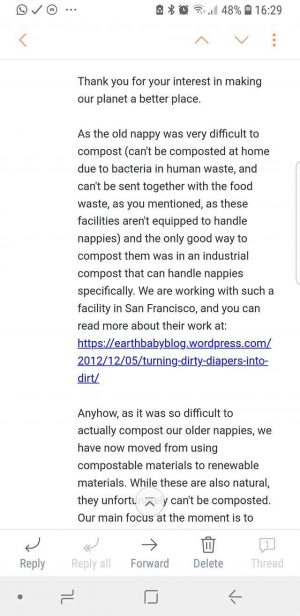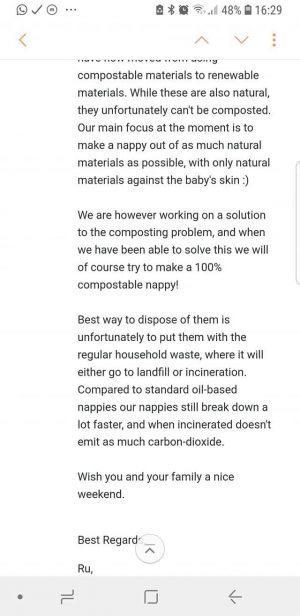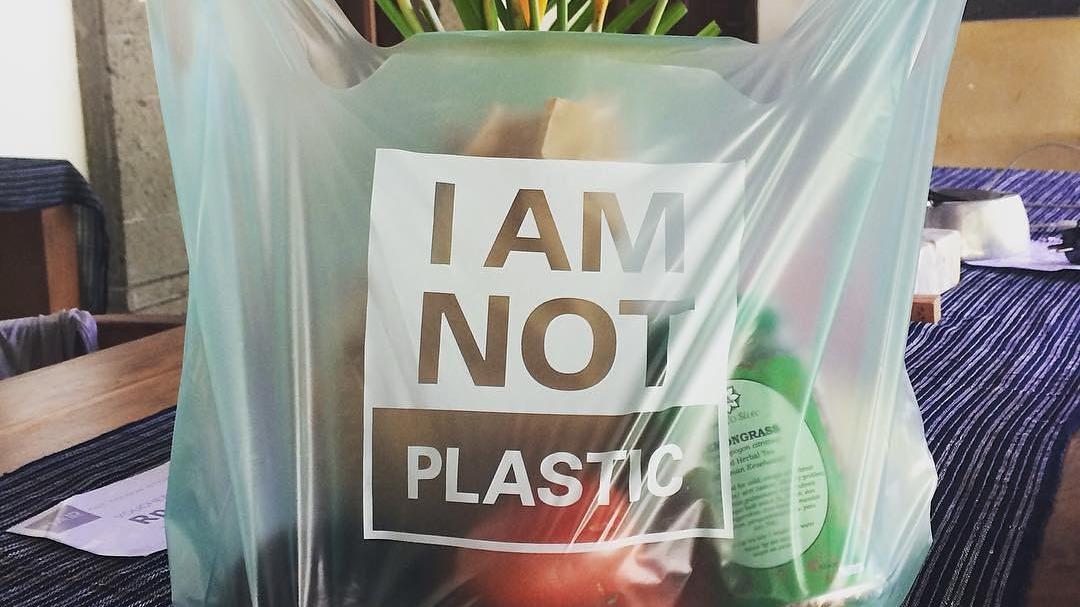 I’ve been skirting around the issue for a while now but biodegradable products (nappies, wipes, coffee cups, sanitary products etc…) keep finding their way back into conversations – even Michael Gove mentioned biodegradable wipes at the recent Conservative Party Conference. I’m not an environmentalist but I have spent a long time researching this issue. So yep, it’s time to talk about the biodegradable label – what it means and why it isn’t all its cracked up to be – especially by those clever Marketeers who are shouting loud about their plastic product’s biodegradable credentials.
I’ve been skirting around the issue for a while now but biodegradable products (nappies, wipes, coffee cups, sanitary products etc…) keep finding their way back into conversations – even Michael Gove mentioned biodegradable wipes at the recent Conservative Party Conference. I’m not an environmentalist but I have spent a long time researching this issue. So yep, it’s time to talk about the biodegradable label – what it means and why it isn’t all its cracked up to be – especially by those clever Marketeers who are shouting loud about their plastic product’s biodegradable credentials.
So let’s dig deeper for a minute because the absolute first thing to say about this issue is that it’s confusing. What does ‘biodegradable’ even mean? (we’ll leave bioplastic, bio-based, bio-polymer for another day. Note that compostable is different to biodegradable and means that something is made of organic matter which is capable of being completely broken down by micro organisms decomposers to form a nutrient rich soil or ‘compost’ – but also worth remembering that it is only able to do so under compostable conditions
Biodegradable refers to any materials that break down in the environment – for example a plastic bag over time will disintegrate into smaller pieces but these can still be harmful to organisms and soils.
When I say ‘over time’, I mean a LONG time. You see, it all depends where the item is sent. If it is sent to landfill it likely won’t ever break down – to decompose, it requires specific conditions – a high temperature of around 50C and plenty of moisture (in other words, not conditions found in landfill or in the ocean). It might decompose faster than conventional plastic but we’re still talking hundreds of years. And then when the carrier bag does degrade as the carrier bag it once was, it disintegrates into millions and millions of very small bits of plastic – otherwise known as microplastics – which in fact cause more damage to the soil and water. Some experts actually recommend burning biodegradable products.
When one of my awesome followers, Ellen, questioned a certain nappy brand about their eco friendly status and how to dispose of them, here’s what she got back:


There is also a fascinating study carried out by the students of Team Marine, an ocean conservation organisation. They put all sorts of items (from dog waste bags through to eco wipes, cups, straws and utensils) that were branded and certified as compostable or biodegradable into the sea for two years and looked at how accurate the standards and claims were. The results showed that most bioplastic products persisted in the environment in the same way as their petroleum based counterparts. They concluded that bioplastics should be restricted in the same way as single use plastics. Most of the products they tested were American but it really is an interesting read. You can see the results with images at each stage of decomposition from page 16 of the report here.

So where does all this (somewhat depressing) news leave us?
The main solution to the plastic problem is to consume less of it in the first place, to use reusables where possible and to improve waste collection and recycling, particularly in the developing world. You see, opting for a takeaway coffee in a biodegradable cup in your local cafe or buying those biodegradable nappies might feel like you’re doing the right thing, but without the proper conditions to actually biodegrade, it’s in reality a waste of effort and money because they are being burned or going to landfill. Brands should be held responsible and labelling must be clearer ; companies seem to be trying to profit from consumers’ who are simply trying their best.
There are advantages to biodegradable products; namely in their initial production but reducing landfill likely ain’t one of them. I still don’t really know where I stand on the nappy front – on the odd occasion we have to use disposables, I do still opt for so called biodegradable but it still bothers me. The most frustrating part is that these items are sold to us as an environmental solution when actually, it turns out, they can make things even worse. They’re also more expensive, which leaves me at least, feeling at best frustrated and at worst, peeved off.
This isn’t a post to put off well-intention consumers ; it’s simply to say be wary because it’s confusing and precisely because we’re all trying our best. If you see a product using the term ‘biodegradable’ (or ‘compostable’) without explaining what exactly they mean and under what conditions the item will break down, perhaps just think twice about purchasing the product, or better still, challenge them on their use of this language.
What’s your take on the biodegradable or compostable label? Do you buy biodegradable items?
Emma xx
P.S. 10 Ways to Reduce Waste and Live with Less and Bad Plant Parenting


YES!! I have this conversation with expectant families almost weekly. Choosing biodegradable is often just an expensive way of feeling good rather than doing good. It’s so complicated and frustrating and we can all only do our best. Thanks for tackling it and acknowledging we can only ever do what we do and it doesn’t have to be perfect. Much love xxx
I never knew this about biodegradable waste. I would have always assumed something that was biodegradable would break down with little harm to the environment. Ive just bought my boys some biodegradable toothbrushes (bamboo) due to feeling so horrified at the thought of a normal toothbrush basically never breaking down. I had thought that that was a better option but assuming the same applies in this case?
Bamboo is just wood.
I have no idea what the bristles are.. But if you snap them off once it’s reached the end of it’s life. You can just throw it in your garden plants and it’ll take as long to rot down as a wood chipping off a tree takes to rot down.
In its response, the company mentioned incineration and the amount of carbon dioxide it causes when plastic is burned. Our local facility incinerates and creates energy from it, and that causes a lot of complacency here. I hear people justify all the time that “at least it’s not going to a landfill”. Have you written about/addressed that problem specifically? I’ve had a hard time finding straight answers anywhere. Thank you for your example and efforts to help others learn and improve! We as a family have a long way to go, but we try!
I have only just started looking into all of this so I really don’t know much about it. I am someone who buys biodegradable wipes and nappies thinking I was doing the right thing, until someone made me question what happens to our waste. In my local area they will soon be burning the rubbish and the biodegradable nappies have less chemicals in them – are they better for that reason? Is there any way we can make sure they have the right conditions to break down (I’m just not ready for cloth nappies!).
Interesting (and sad) news. About nappies, I usually use biodegradable ones, but the thing is (in Italy) we cannot throw them in the compostable waste bin. So I was asking what’s the advantage of useing biodegradable nappies (despite of less plastic on babies skin)…is it simply a new marketing strategy? Very interesting article, I will try to learn more about the Italian situation. love
Emma, this is very informative- well, informative enough (not complicated by science detail!). Generally I love that you have a large audience and can influence consumer behaviour in a positive way. However, I was a bit concerned at a recent promo you did for a company recycling plastic into a bag. In the same way as biodegradable will likely lead to guilt free shopping, so too might being encouraged to buy recycled plastic bags/socks/other items. This causes complacency which is dangerous because, as you note here for biodegradables, people will think they’re doing the best thing when actually making the problem worse. While I appreciate the innovation of start up companies to find a way of using the plastic that exists on the planet, I fear big corporations will link with them so they can use/produce plastic so it’s ‘business as usual’ (A’s is happening with Pepsi and Walkers crisps). Just environmental mitigation really (I am an environmental assessor)! Also most plastic can only be recycled once so what then? No easy answers here but I feel influencers are at risk of being used to facilitate the agenda of corporations via small innovative start up businesses that relieve the conglomerates of their problem. This can undo all the good work an influencer may have previously achieved. So I guess I’m saying to please consider whether collaborating with companies who recycle plastic products is environmentally right. We should be refusing plastic in any form as the goal, with recycling being seen as a last resort/failure. Must be some new products out there that are plastic alternatives (natural)which would offer a much better promo opportunity. For me, if recycling plastic has to happen, it should be for long life products like buildings/roads etc rather than a fashion item. Your doing a great job though girl!